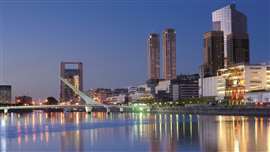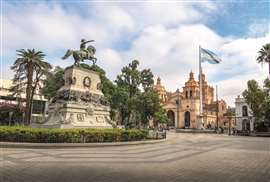What lies ahead for Argentina and its construction market?
11 January 2024
Argentina has secured finance to develop its infrastructure, but a new President may have different plans. Catrin Jones looks at what the future for construction might hold.
The government of Argentina’s vision for economic and social improvement has relied heavily on infrastructure upgrades through the involvement of the state. However, this approach is likely to change with the election of Javier Milei, who defeated former finance minister Sergio Massa and became President at the end of last year.
 Construction activity in Argentina is down (Photo: AdobeStock)
Construction activity in Argentina is down (Photo: AdobeStock)
Milei inherits a country with severe problems, including inflation and rising poverty, and one of the issues he’ll need to address is the country’s infrastructure. According to the Global Infrastructure Outlook (the G20’s infrastructure analysis centre), Argentina’s planned infrastructure investments need to be around 1.68% Gross Domestic Product (GDP) every year until 2040 in order to achieve a 3% GDP growth.
Argentina had planned to invest approximately US$452 billion by 2040 in infrastructure projects. This investment is aimed at closing the infrastructure gap in the country, especially in areas such as rail transport, water infrastructure, and roads.
The Inter-American Development Bank and World Bank have committed funding for new roads, rail, ports, and utilities under Argentina’s previous administration, however, there has been a shift in infrastructure priorities by sector and scalability.
In the short term, the Argentine government’s former administration was focused on small-scale infrastructure projects – in the US$20 million range – including opportunities for local companies in an effort to create local jobs.
Top government priority projects were said to have included the construction of pipelines for hydrocarbon transport, railway modernisation, and expansion of existing power transmission lines, as well as mining sector-related infrastructure.
How much these priorities will change now that Milei is President is unknown, although he has made it clear that he wants to dramatically reduce the size of government and promote free trade. It is thought that he could reduce the role of the State in all sectors of the economy, including energy distribution, road operation and water services, handing them off to the private sector.
Road infrastructure revamp
It is estimated that fewer than 35% of Argentina’s roads are paved, a lower proportion compared to neighbouring countries such as Paraguay and Venezuela. The country has an ambitious project to improve its roads and transport infrastructure in the coming years.
Argentina’s public funding exclusively supports the infrastructure sector, and this often comes with the additional support of international agencies. More recently, the Inter-American Development Bank (IDB) has approved a credit package worth US$1 billion to fund the construction of a new bridge over the Paraná River in Northeast Argentina.
The board of the bank gave the green light to a US$700 million credit line and a US$345 million “first loan” to build a bridge between the provinces of Chaco and Corrientes, along with the necessary access roads.
 Two provinces are currently connected by the two-lane General Manuel Belgrano Bridge (Photo: By Jara-Arroyo - Own work, CC BY-SA 4.0)
Two provinces are currently connected by the two-lane General Manuel Belgrano Bridge (Photo: By Jara-Arroyo - Own work, CC BY-SA 4.0)
The IDB has stated that the bridge would benefit 870,000 people, and an estimated 88,000 people would use it on a daily basis. The construction will include building a 772m cable-stayed bridge, 5.6km of viaducts, and 28km of related highway infrastructure.
The total cost of the project will be funded by a US$345 million loan.
The country is also looking to renovate its rail infrastructure, with plans to refurbish more than 1,500km of links from the north and west to the ports of Rosario and Buenos Aires to facilitate exports.
More recently, the government initiated negotiations with China Machinery Engineering Corporation (CMEC), to invest in the country’s rail network.
The former Transport Minister, Diego Giuliano, who stepped down from his role in December 2023, held talks with CMEC to secure an investment of US$816 million for rail infrastructure and rolling stock, as part of an earlier agreement between the two parties.
Chinese investment in Argentina
Giuliano said, “We are going to work with CMEC on […] a contract that began in 2006 for railway works that must be unlocked so that an investment of US$816 million can begin.”
The government commented in a press release that the negotiations followed previous talks held by Sergio Massa, the country’s former economics minister, and Wang Dongwei, China’s deputy finance minister. These centred around the provision of US$3 billion in loans for six rail projects across Argentina.
For the past 17 years, CMEC has been an active participant in the Argentine rail sector. Its focus has been on the development of the Belgrano Cargas freight network – the network spans a total of 15,305km.
In September 2015, CMEC announced that it would double its investment in the network from US$2.4 billion to US$4.8 billion. As a result, the company has already completed renovations on over 200km of tracks and constructed several new bridges as part of its infrastructure projects.
Further investments have been secured with other Chinese investors. In June 2023, an Argentine delegation secured US$3 billion in investments from Chinese institutions to finance infrastructure projects in Argentina.
 Argentina had planned to invest approximately US$452 billion by 2040 in infrastructure projects (Photo: AdobeStock)
Argentina had planned to invest approximately US$452 billion by 2040 in infrastructure projects (Photo: AdobeStock)
Sergio Massa co-signed the deal, a part of China’s global infrastructure development strategy, Belt and Road Initiative (BRI), with the vice chairman of the National Development and Reform Commission, Li Chunlin.
China and Argentina’s co-operation plan is said to further deepen bilateral economic and trade cooperation.
The Bank of China (BOC), the China Development Bank (CDB), the China CITIC Bank, the Export–Import Bank of China (Eximbank), and the Industrial and Commercial Bank of China (ICBC) are among the entities that will finance infrastructure works in Argentina.
Some of the projects that will receive financing include, the repowering of Belgrano Cargas II, a rehabilitation project that foresees new railroad works, and the Roca Railroad project US$236 million investment.
The CITIC Bank will finance sewage and water plant works for AySA, a state-owned Argentine company that provides running water and sewer services, in Esteban Echeverria-Ezeiza, Laferrere, and San Justo, in Buenos Aires, for US$650 million.
According to the Global Times, a Chinese expert said that the cooperation plan will be of “exemplary significance” to major Latin American countries that have not yet signed the Memorandum of Understanding (MoU) with China.
China is hopeful that other countries across Latin America will lead by Argentina’s example and join the Belt and Road Initiative to further their infrastructure development.
Much needs to be done to upgrade Argentina’s infrastructure and, at the moment, China is a willing investor. The next decade will decide whether Argentina has built and reconstructed enough of its infrastructure to be a leader among other Latin American countries.
The approach that the new government of Javier Milei takes to the sector will also be key. It remains to be seen if his preference of handing over work from the state to the private sector has a positive impact or not on a country that desperately needs its infrastructure to be upgraded and invested in.
STAY CONNECTED



Receive the information you need when you need it through our world-leading magazines, newsletters and daily briefings.
CONNECT WITH THE TEAM








